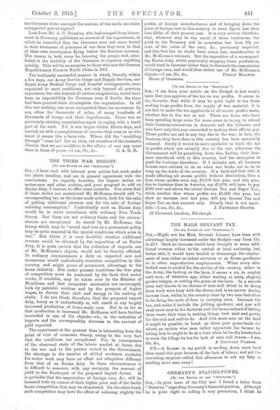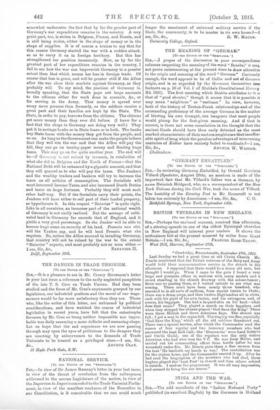GERMANY'S STAYING-POWER, [To Taa EDITOR OF Tag " SPECTATOR."' Sin,—In
your issue of the 11th inst. I found a letter from " Batavier "regarding Germany's financial position. Although he is quite right in calling it very precarious, I think he somewhat underrates the fact that by far the greater part of Germany's war expenditure remains in the country. A very great part, too, is stolen in Belgium, France, and Russia, and is still being stolen, either in the shape of money or in the shape of supplies. It is of course a truism to say that for this reason Germany started the war with a sudden attack, so as to carry it on in foreign territory. But this has strengthened her position immensely. Now, as by far the greatest part of her expenditure remains in the country, I fail to see how the war can impoverish Germany to a greater extent than that which means her loss in foreign trade. Of course that loss is great, and will be greater still if the Allies after the war close their markets against Germany, as they probably will. To my mind, the position of Germany is, broadly speaking, that the State pays out large amounts to the citizens either for work done in arsenals, &a., or for serving in the Army. That money is spread over many more persons than formerly, as the soldiers receive a great part and their families are kept by the State. The State, in order to pay, borrows from the citizens. The citizens get more money than they ever did before. (I know for a fact that the shops in Germany are doing very well.) They put it in savings-banks or in State loans or in both. The banks buy State loans with the money they get from the people, and so on. As long as the Government can make the people believe that they will win the war and that the Allies will pay the bill, they can go on issuing paper money and floating huge loans. This may go on for quite another year. The end will be—if Gessnany is not ruined by invasion, in retaliation of what she did to Belgium end the North of France—that the National Debt will be enhanced by a gigantic amount, and that they will quarrel as to who will pay the taxes. The Junkers and the wealthy traders and bankers will try to increase the taxes on all articles of consumption. The Socialists will want increased Income Taxes, and also increased Death Duties and taxes on large fortunes. Probably they will meet each other half-way. But if the Socialists carry their points, the Junkers will have either to sell part of their landed property, or hypothecate it. In this respect " Bata.vier " is quite right. Like in all countries, an immense part of the national wealth of Germany is not easily realized. But the acreage of culti- vated land in Germany far exceeds that of England, and it yields a very good percentage. So the Junker will be able to borrow huge sums on security of his land. Peounia non olet, will the Yankee say, and he will lend Prussia what she requires. So, unless the Allies succeed in invading Germany, that country will not be ruined by the war to the extent "Batavier " expects, and most probably not so soon either — .Delft, September 19th.















































 Previous page
Previous page